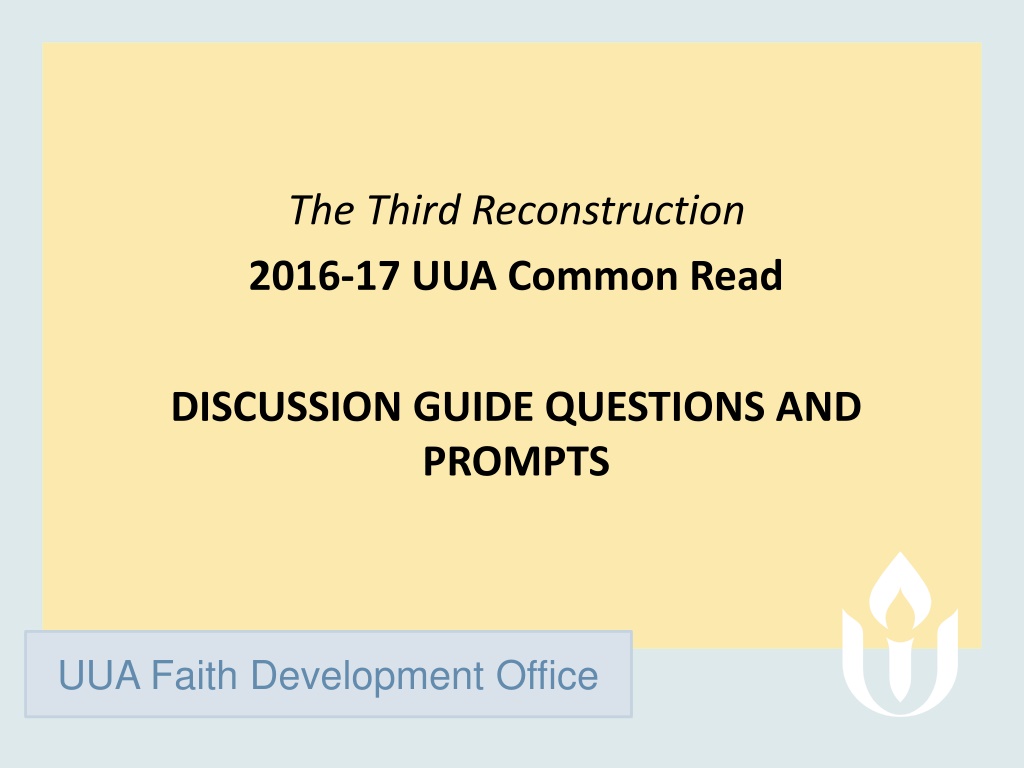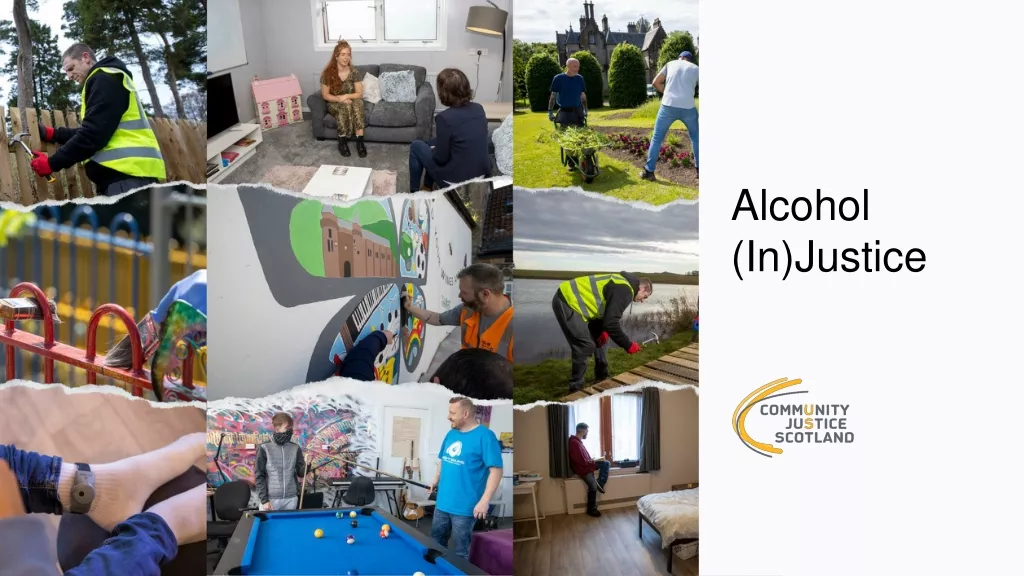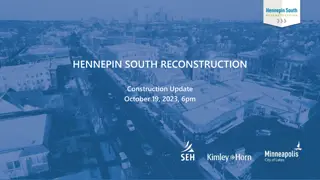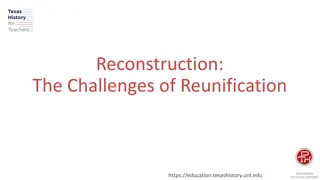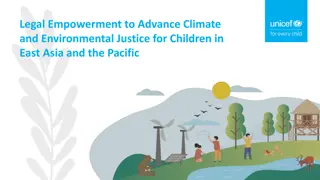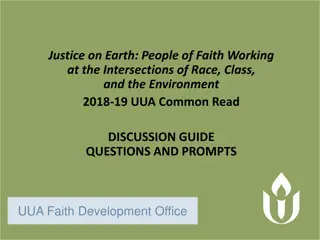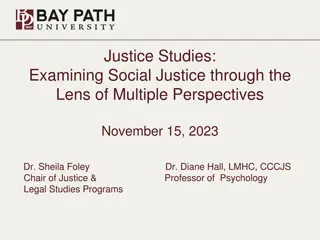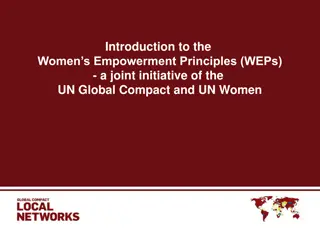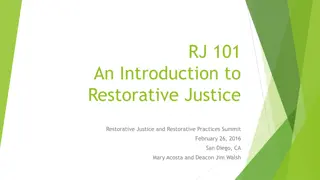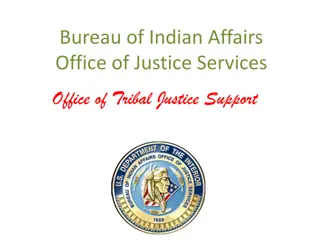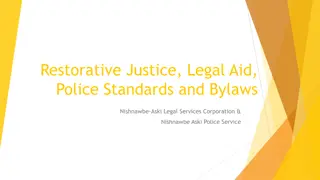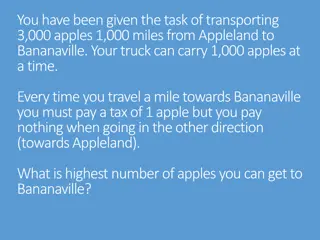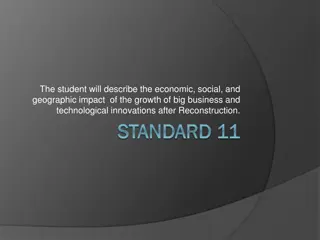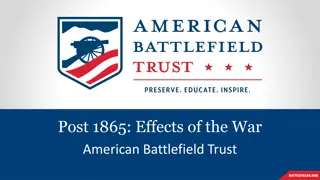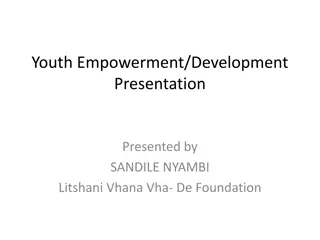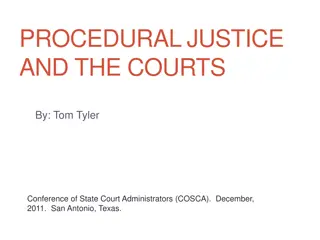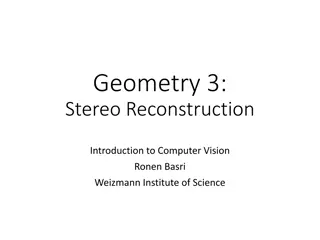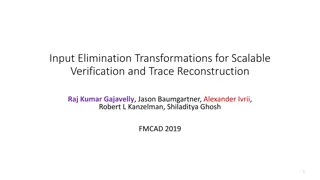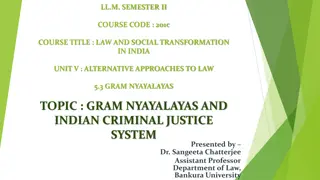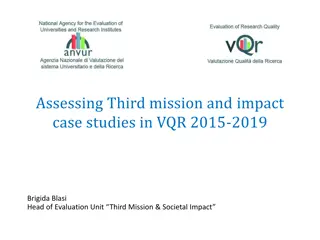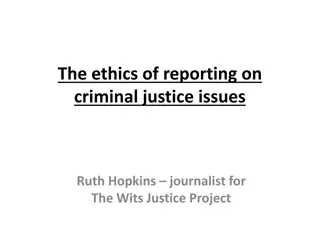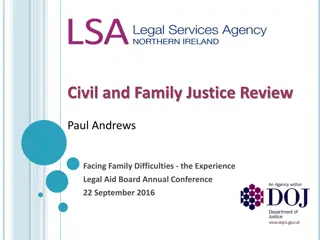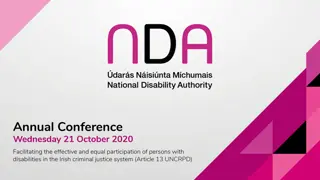Exploring Justice and Empowerment Through The Third Reconstruction - Discussion Guide
Delve into thought-provoking questions and prompts from the UUA Faith Development Office aimed at fostering meaningful discussions on justice, community empowerment, and the impact of historical movements like the Civil Rights era. Reflect on personal experiences, share perspectives on local activism, and examine the centrality of race in societal progress.
Download Presentation

Please find below an Image/Link to download the presentation.
The content on the website is provided AS IS for your information and personal use only. It may not be sold, licensed, or shared on other websites without obtaining consent from the author. Download presentation by click this link. If you encounter any issues during the download, it is possible that the publisher has removed the file from their server.
E N D
Presentation Transcript
The Third Reconstruction 2016-17 UUA Common Read DISCUSSION GUIDE QUESTIONS AND PROMPTS UUA Faith Development Office
SINGLESESSION VERSION UUA Faith Development Office
Covenant We promise to speak from our own experiences and perspectives. We promise to listen respectfully to the experiences and perspectives of other people. We promise to pay attention to the group process, making sure that everyone has the opportunity to speak and to listen. We promise to use this time as an opportunity for ethical, religious, and spiritual discernment. We promise to listen to one another for understanding rather than to debate, even when the conversation touches on politics or public policy. UUA Faith Development Office
First Impressions What stays with you after reading the book, The Third Reconstruction? UUA Faith Development Office
Sharing and Discussion: Empower Local People How does the idea that effective justice organizing must arise from local concerns connect with your own experiences? Have you ever been part of a local organization trying to make your community or state a better place for all? What are the advantages both tactical and spiritual of going back home in our justice-making efforts? UUA Faith Development Office
Sharing: Lifting Up Voices of those Directly Affected Speak about a time when you witnessed or experienced the microphone being handed to poor or marginalized people that they might tell their own stories. Have you ever been in the position to share your story publicly as one directly affected by oppression or injustice? UUA Faith Development Office
Video and Discussion: The Centrality of Race What did you learn in school or from your own study about post Civil War reconstruction? About the Civil Rights movement? What surprised, unsettled, or uplifted you in Barber s framing those two movements as the First Reconstruction and the Second Reconstruction? What do the lessons of history tell you about the strong push back in the public square that we see today? UUA Faith Development Office
Reflecting and Acting: Possible Actions Read and share Fourteen Steps Forward Together, from the book s Appendix (p. 127). Gather an ongoing group to explore how to apply those steps to your congregation s justice work. Get to know local organizations led by people directly affected by injustice. Explore their websites or written information and attend public actions or events they sponsor. Find out how your congregation or group can be helpful and what resources the organizations offer so you can learn more. Can your congregation offer meeting space for interfaith groups or secular organizations working on justice issues using a moral argument? (continued on next slide) UUA Faith Development Office
Reflecting and Acting: Possible Actions Learn about legislative initiatives that call for a moral stance. Check with your state s Unitarian Universalist State Advocacy Network, if there is one, to find out about their efforts. Help organize support for initiatives in line with Unitarian Universalist values. Explore the website of Black Lives of Unitarian Universalism (BLUU). Learn more about the #ReviveLove Tour focused on movement fortification and healing, and co-sponsored by Standing on the Side of Love and Rev. Sekou and the Holy Ghost. (continued on next slide) UUA Faith Development Office
Reflecting and Acting: Possible Actions Learn more about Repairers of the Breach, an organization that works to reconnect our shared faith traditions with public policies rooted in the moral values of justice, fairness, and the general welfare, which are embedded in the federal and state Constitutions; and train clergy and lay moral leaders and advocates to become fusion-movement leaders and to freshen the great wellsprings of our democracy based on past moral movements that have made possible the great progressive victories in our history. Watch and share videos and resources from the website. Find out if a moral revival event is coming to a city near you, and if so, make plans to attend. (continued on next slide) UUA Faith Development Office
Reflecting and Acting: Possible Actions Connect with the local chapter of Showing Up for Racial Justice (SURJ). SURJ is a national network of groups and individuals organizing White people to act as part of a multi-racial majority for racial justice while supporting and collaborating with local and national racial justice organizing efforts. Get involved with the work of Standing on the Side of Love (SSL). Read Facing the Dragon, a March 16, 2016, letter by Caitlin Breedlove, SSL campaign director, about the role Unitarian Universalists can play in today s movement for social justice. (continued on next slide) UUA Faith Development Office
Reflecting and Acting: Possible Actions Organize small groups in your congregation to more deeply explore personal journeys through the lens of race. Connect with or visit the website of DRUUMM, a UU People of Color organization, or visit the website of Unitarian Universalist Allies for Racial Equity (ARE) for resources, suggestions, and connections. (continued on next slide) UUA Faith Development Office
Reflecting and Acting: Possible Actions Gather to read or reread some past Common Reads which may be helpful in your work. The UUA s discussion guides for each include links to supplementary resources and suggestions for action. Just Mercy by Bryan Stevenson (death penalty abolition; prison and criminal justice system reform) Reclaiming Prophetic Witness by Paul Rasor (UU moral values in public issues) Behind the Kitchen Doorby Saru Jayaraman (food workers rights) The New Jim Crow by Michelle Alexander (opposition to mass incarceration/racism in US criminal justice system) Acts of Faith by Eboo Patel (interfaith justice-making work) The Death of Josseline by Margaret Regan (immigration) UUA Faith Development Office
THREE-SESSION VERSION SESSION 1: MORAL DISSENT UUA Faith Development Office
Covenant We promise to speak from our own experiences and perspectives. We promise to listen respectfully to the experiences and perspectives of other people. We promise to pay attention to the group process, making sure that everyone has the opportunity to speak and to listen. We promise to use this time as an opportunity for ethical, religious, and spiritual discernment. We promise to listen to one another for understanding rather than to debate, even when the conversation touches on politics or public policy. UUA Faith Development Office
First Impressions What stays with you after reading the book, The Third Reconstruction? What surprised, troubled, or challenged you, or made you think? What inspired you from the book? UUA Faith Development Office
Sharing: Stories of Moral Resistance and Dissent What in your story/experience can you offer as testimony to the power of moral resistance? What stories can you tell of times when you acted on the belief that your own well-being is connected to the well-being of those who suffer? Was your moral dissent rooted in your Unitarian Universalist faith? If so, how? UUA Faith Development Office
Conversation: Sowing Seeds in Defeat When have you been part of a justice effort or event that was unsuccessful or that ended in defeat? What lessons did you take from that defeat? Do Barber s insights change your understanding in any way? Reflect on the positives in the seeming negative. How does one balance what is politically attainable at a particular moment with what is morally right? Has Barber s call for taking the long view, no matter what, changed your thinking about that balance? UUA Faith Development Office
Closing What does hope look like for you? What stories of hope do you hold in your heart to sustain you in acting for justice? UUA Faith Development Office
THREE-SESSION VERSION SESSION 2: LEADERSHIP UUA Faith Development Office
Discussion: Local Concerns How does the idea that effective justice organizing must arise from local concerns connect with your own experiences? Have you ever been part of a local organization trying to make your community or state a better place for all? What are the advantages both tactical and spiritual of going back home in our justice- making efforts? UUA Faith Development Office
Sharing: Lifting up Voices of Those Directly Affected Speak about a time when you witnessed or experienced the microphone being handed to poor or marginalized people that they might tell their own stories. Have you ever been in the position to share your story publicly as one directly affected by oppression or injustice? UUA Faith Development Office
Conversation: Black Lives of Unitarian Universalism Why is it so important both to Rev. Barber s coalition and to BLUU that those most directly affected be the ones to speak and to lead? Why does such a principle need to be so clearly stated? UUA Faith Development Office
Discussion and Commitment: Pledging Allegiance to the Other America Have you heard or been part of conversations where people express frustration over their inability to point to a national leader for the movement for racial justice? Share your experience of a time when you have heard or been part of conversations where people not directly affected have made judgements regarding the tactics or strategy of locally organized movements for justice, or even tried to lead those movements. Why is it that well-meaning people often try to speak for marginalized people in the public square? (continued on next slide) UUA Faith Development Office
Discussion and Commitment: Pledging Allegiance to the Other America What would change in the justice work of your congregation, group, or organization if a priority was placed on creating space for marginalized people to tell their own stories in the halls of power and in the public square? What role can people with privilege and power play in ensuring that marginalized people have the opportunity to do this? (continued on next slide) UUA Faith Development Office
Discussion and Commitment: Pledging Allegiance to the Other America What commitments will you make to help your congregation or organization prioritize the voices and leadership of those most directly affected by oppression? How will your commitments require you to shift your own behavior? If you are among those directly affected by injustice, what commitments will you make to lift up your voice and experience? If you come from a place of privilege, how will you prioritize the voices of those most directly affected? UUA Faith Development Office
THREE-SESSION VERSION SESSION 3: BUILDING COALITIONS FOR THE THIRD RECONSTRUCTION UUA Faith Development Office
Videos and Discussion: Framing History What did you learn in school or from your own study about the post-Civil War Reconstruction? About the Civil Rights movement? What surprised, unsettled, or uplifted you in Barber s framing of those two movements as the First Reconstruction and the Second Reconstruction? Today s movements for justice and equality include Black Lives Matter, transgender rights, and economic justice. How does framing those movements as part of a nascent Third Reconstruction unify them and help their members work together? What do the lessons of history tell you about the strong pushback in the public square that we see today? UUA Faith Development Office
Sharing: Carrying the History Inside of Me Reflect on Jonathan Wilson- Hartgrove s words and on the ways in which you might carry either stories of freedom movements or of resistance to those movements inside their own personal and family history. UUA Faith Development Office
Reflecting and Acting: The Stirring of the Spirit Where is the Spirit stirring in your community or state? Have you personally felt a longing for justice that has moved you to action? Barber calls for a fusion coalition that includes groups and organizations who may seem to be unlikely partners. Has your congregation ever formed a coalition with an unlikely partner? Have you personally? What was that like? What did you learn from that experience? What hesitations do you have about working with people who may not agree with you on every point? How did Barber work through his own hesitations? With whom does your congregation or group partner? How might you expand to include others you with whom have not previously worked? UUA Faith Development Office
Reflecting and Acting: Possible Actions Read and share Fourteen Steps Forward Together, from the book s Appendix (p. 127). Gather an ongoing group to explore how to apply those steps to your congregation s justice work. Get to know local organizations led by people directly affected by injustice. Explore their websites or written information and attend public actions or events they sponsor. Find out how your congregation or group can be helpful and what resources the organizations offer so you can learn more. Can your congregation offer meeting space for interfaith groups or secular organizations working on justice issues using a moral argument? (continued on next slide) UUA Faith Development Office
Reflecting and Acting: Possible Actions Learn about legislative initiatives that call for a moral stance. Check with your state s Unitarian Universalist State Advocacy Network, if there is one, to find out about their efforts. Help organize support for initiatives in line with Unitarian Universalist values. Explore the website of Black Lives of Unitarian Universalism (BLUU). Learn more about the #ReviveLove Tour focused on movement fortification and healing, and co-sponsored by Standing on the Side of Love and Rev. Sekou and the Holy Ghost. (continued on next slide) UUA Faith Development Office
Reflecting and Acting: Possible Actions Learn more about Repairers of the Breach, an organization that works to reconnect our shared faith traditions with public policies rooted in the moral values of justice, fairness, and the general welfare, which are embedded in the federal and state Constitutions; and train clergy and lay moral leaders and advocates to become fusion-movement leaders and to freshen the great wellsprings of our democracy based on past moral movements that have made possible the great progressive victories in our history. Watch and share videos and resources from the website. Find out if a moral revival event is coming to a city near you, and if so, make plans to attend. (continued on next slide) UUA Faith Development Office
Reflecting and Acting: Possible Actions Connect with the local chapter of Showing Up for Racial Justice (SURJ). SURJ is a national network of groups and individuals organizing White people to act as part of a multi-racial majority for racial justice while supporting and collaborating with local and national racial justice organizing efforts. Get involved with the work of Standing on the Side of Love (SSL). Read Facing the Dragon, a March 16, 2016, letter by Caitlin Breedlove, SSL campaign director, about the role Unitarian Universalists can play in today s movement for social justice. (continued on next slide) UUA Faith Development Office
Reflecting and Acting: Possible Actions Organize small groups in your congregation to more deeply explore personal journeys through the lens of race. Connect with or visit the website of DRUUMM, a UU People of Color organization, or visit the website of Unitarian Universalist Allies for Racial Equity (ARE) for resources, suggestions, and connections. (continued on next slide) UUA Faith Development Office
Reflecting and Acting: Possible Actions Gather to read or reread some past Common Reads which may be helpful in your work. The UUA s discussion guides for each include links to supplementary resources and suggestions for action. Just Mercy by Bryan Stevenson (death penalty abolition; prison and criminal justice system reform) Reclaiming Prophetic Witness by Paul Rasor (UU moral values in public issues) Behind the Kitchen Doorby Saru Jayaraman (food workers rights) The New Jim Crow by Michelle Alexander (opposition to mass incarceration/racism in US criminal justice system) Acts of Faith by Eboo Patel (interfaith justice-making work) The Death of Josseline by Margaret Regan (immigration) UUA Faith Development Office
